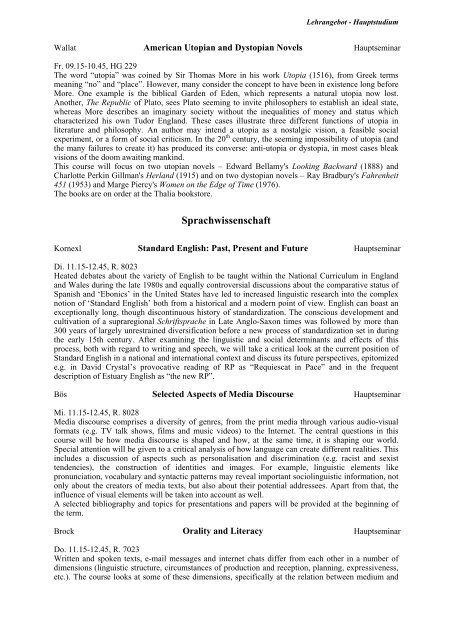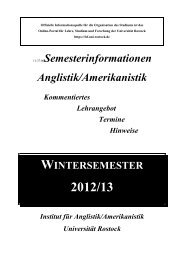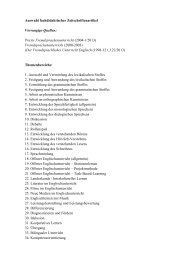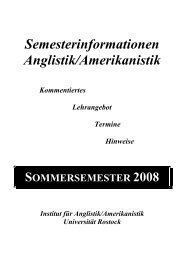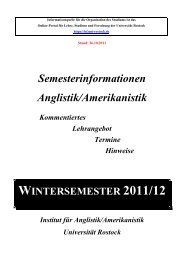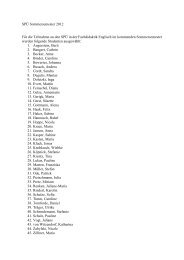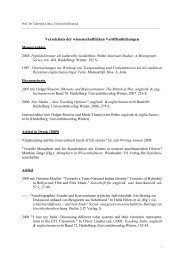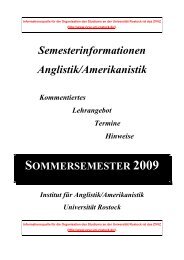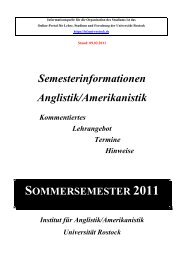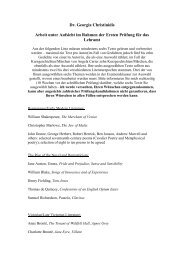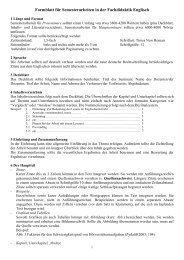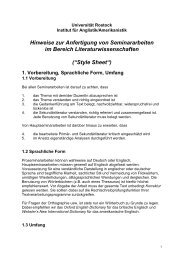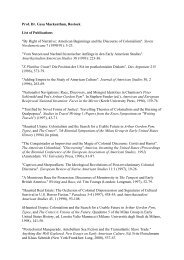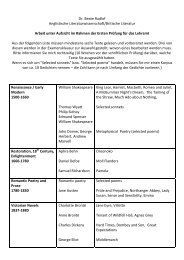SOMMERSEMESTER 2004 - Institut für Anglistik/Amerikanistik
SOMMERSEMESTER 2004 - Institut für Anglistik/Amerikanistik
SOMMERSEMESTER 2004 - Institut für Anglistik/Amerikanistik
Create successful ePaper yourself
Turn your PDF publications into a flip-book with our unique Google optimized e-Paper software.
Lehrangebot - Hauptstudium<br />
Wallat American Utopian and Dystopian Novels Hauptseminar<br />
Fr. 09.15-10.45, HG 229<br />
The word “utopia” was coined by Sir Thomas More in his work Utopia (1516), from Greek terms<br />
meaning “no” and “place”. However, many consider the concept to have been in existence long before<br />
More. One example is the biblical Garden of Eden, which represents a natural utopia now lost.<br />
Another, The Republic of Plato, sees Plato seeming to invite philosophers to establish an ideal state,<br />
whereas More describes an imaginary society without the inequalities of money and status which<br />
characterized his own Tudor England. These cases illustrate three different functions of utopia in<br />
literature and philosophy. An author may intend a utopia as a nostalgic vision, a feasible social<br />
experiment, or a form of social criticism. In the 20 th century, the seeming impossibility of utopia (and<br />
the many failures to create it) has produced its converse: anti-utopia or dystopia, in most cases bleak<br />
visions of the doom awaiting mankind.<br />
This course will focus on two utopian novels – Edward Bellamy's Looking Backward (1888) and<br />
Charlotte Perkin Gillman's Herland (1915) and on two dystopian novels – Ray Bradbury's Fahrenheit<br />
451 (1953) and Marge Piercy's Women on the Edge of Time (1976).<br />
The books are on order at the Thalia bookstore.<br />
Sprachwissenschaft<br />
Kornexl Standard English: Past, Present and Future Hauptseminar<br />
Di. 11.15-12.45, R. 8023<br />
Heated debates about the variety of English to be taught within the National Curriculum in England<br />
and Wales during the late 1980s and equally controversial discussions about the comparative status of<br />
Spanish and ‘Ebonics’ in the United States have led to increased linguistic research into the complex<br />
notion of ‘Standard English’ both from a historical and a modern point of view. English can boast an<br />
exceptionally long, though discontinuous history of standardization. The conscious development and<br />
cultivation of a supraregional Schriftsprache in Late Anglo-Saxon times was followed by more than<br />
300 years of largely unrestrained diversification before a new process of standardization set in during<br />
the early 15th century. After examining the linguistic and social determinants and effects of this<br />
process, both with regard to writing and speech, we will take a critical look at the current position of<br />
Standard English in a national and international context and discuss its future perspectives, epitomized<br />
e.g. in David Crystal’s provocative reading of RP as “Requiescat in Pace” and in the frequent<br />
description of Estuary English as “the new RP”.<br />
Bös Selected Aspects of Media Discourse Hauptseminar<br />
Mi. 11.15-12.45, R. 8028<br />
Media discourse comprises a diversity of genres, from the print media through various audio-visual<br />
formats (e.g. TV talk shows, films and music videos) to the Internet. The central questions in this<br />
course will be how media discourse is shaped and how, at the same time, it is shaping our world.<br />
Special attention will be given to a critical analysis of how language can create different realities. This<br />
includes a discussion of aspects such as personalisation and discrimination (e.g. racist and sexist<br />
tendencies), the construction of identities and images. For example, linguistic elements like<br />
pronunciation, vocabulary and syntactic patterns may reveal important sociolinguistic information, not<br />
only about the creators of media texts, but also about their potential addressees. Apart from that, the<br />
influence of visual elements will be taken into account as well.<br />
A selected bibliography and topics for presentations and papers will be provided at the beginning of<br />
the term.<br />
Brock Orality and Literacy Hauptseminar<br />
Do. 11.15-12.45, R. 7023<br />
Written and spoken texts, e-mail messages and internet chats differ from each other in a number of<br />
dimensions (linguistic structure, circumstances of production and reception, planning, expressiveness,<br />
etc.). The course looks at some of these dimensions, specifically at the relation between medium and


